Unit 7 Will people have robots? Section A Grammar课件(17张PPT)
文档属性
| 名称 | Unit 7 Will people have robots? Section A Grammar课件(17张PPT) | 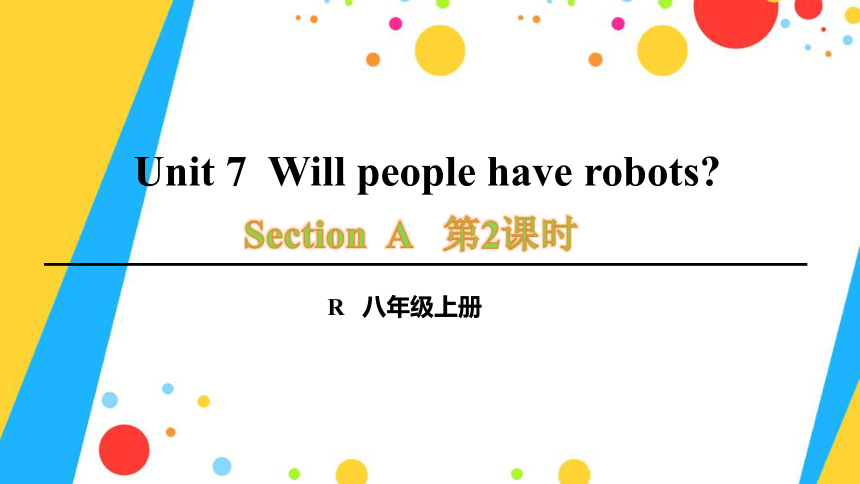 | |
| 格式 | pptx | ||
| 文件大小 | 3.2MB | ||
| 资源类型 | 教案 | ||
| 版本资源 | 人教新目标(Go for it)版 | ||
| 科目 | 英语 | ||
| 更新时间 | 2021-07-10 10:54:13 | ||
图片预览

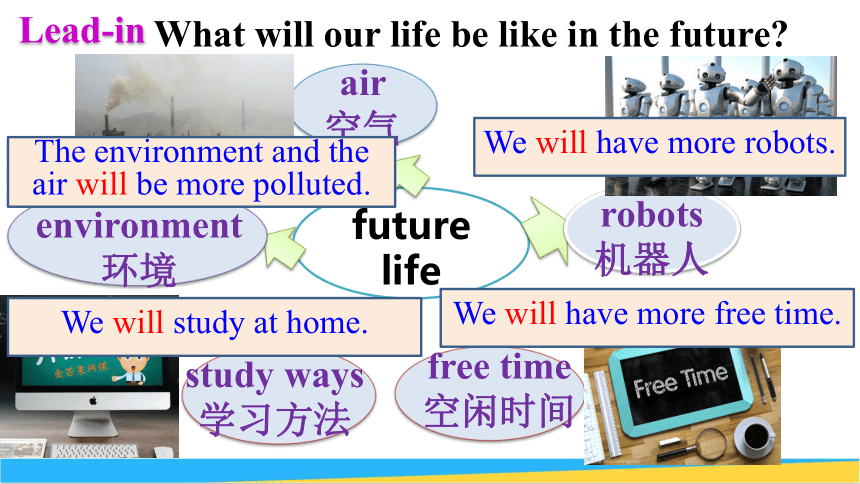
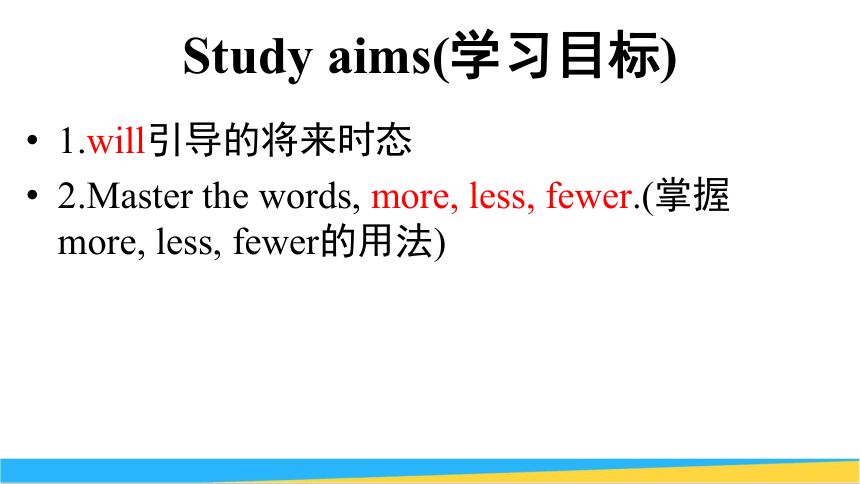
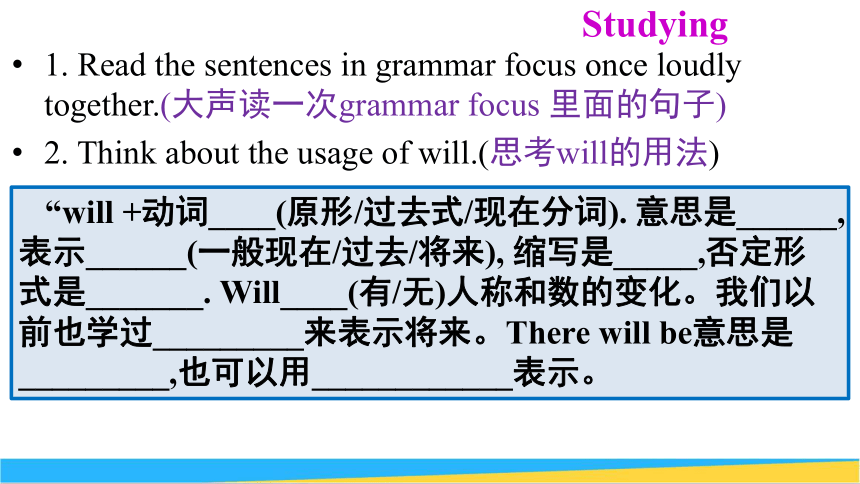
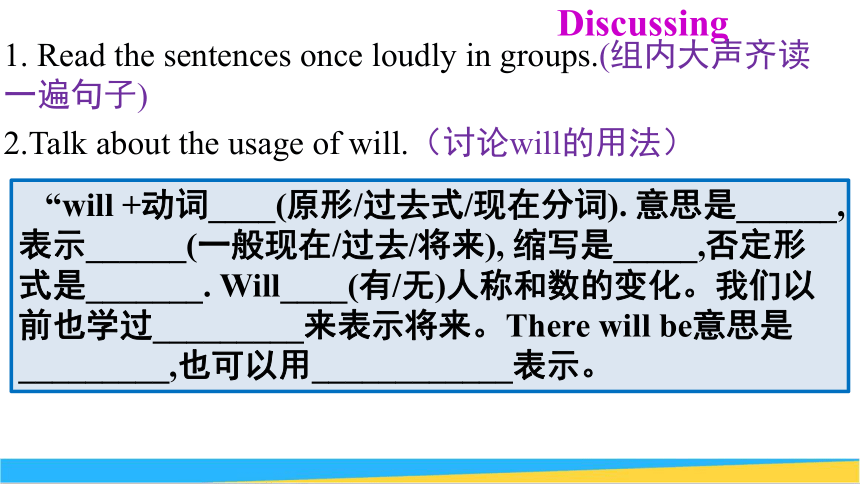
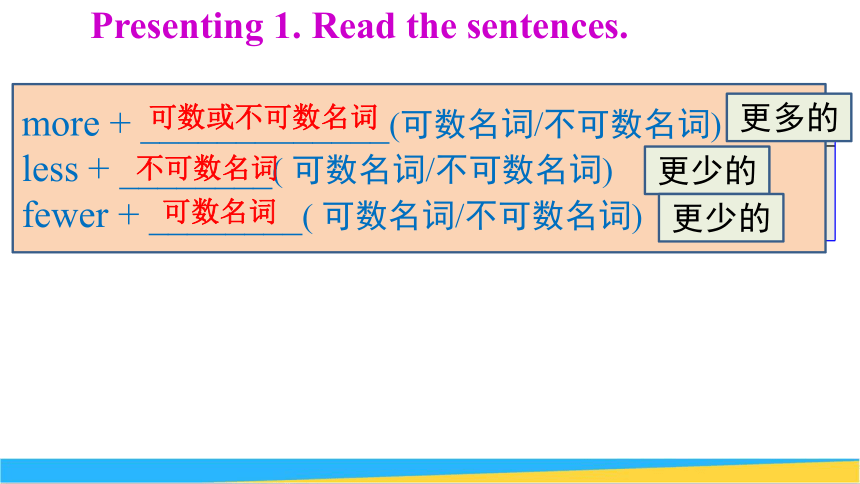
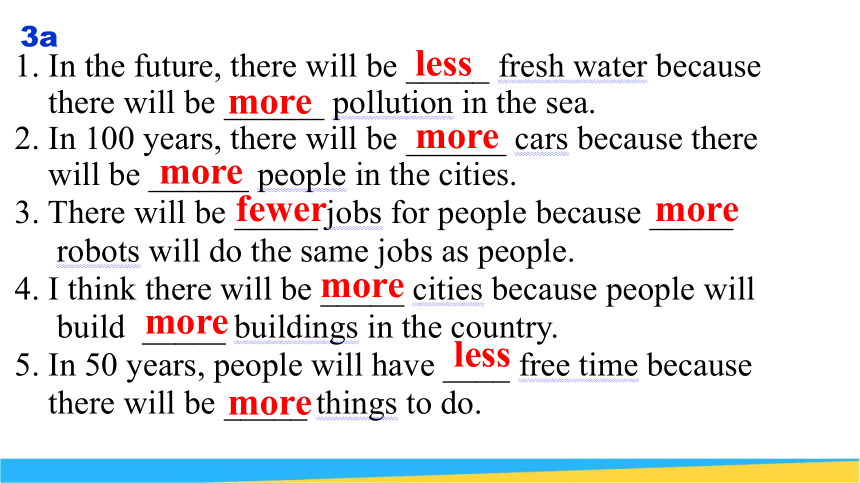
文档简介
R 八年级上册
Section A 第2课时
Unit 7 Will people have robots?
Lead-in
air
空气
robots
机器人
future life
environment
环境
free time
空闲时间
study ways
学习方法
What will our life be like in the future?
The environment and the air will be more polluted.
We will have more robots.
We will have more free time.
We will study at home.
Study aims(学习目标)
1.will引导的将来时态
2.Master the words, more, less, fewer.(掌握 more, less, fewer的用法)
Studying
1. Read the sentences in grammar focus once loudly together.(大声读一次grammar focus 里面的句子)
2. Think about the usage of will.(思考will的用法)
“will +动词____(原形/过去式/现在分词). 意思是______,表示______(一般现在/过去/将来), 缩写是_____,否定形式是_______. Will____(有/无)人称和数的变化。我们以前也学过_________来表示将来。There will be意思是_________,也可以用____________表示。
Discussing
1. Read the sentences once loudly in groups.(组内大声齐读一遍句子)
2.Talk about the usage of will.(讨论will的用法)
“will +动词____(原形/过去式/现在分词). 意思是______,表示______(一般现在/过去/将来), 缩写是_____,否定形式是_______. Will____(有/无)人称和数的变化。我们以前也学过_________来表示将来。There will be意思是_________,也可以用____________表示。
Presenting 1. Read the sentences.
Countable nouns (可数名词)
Uncountable nouns(不可数名词)
There will be more people.
There will be fewer trees.
There will be more pollution.
There will be less free time.
more + _____________(可数名词/不可数名词)
less + ________( 可数名词/不可数名词)
fewer + ________( 可数名词/不可数名词)
可数或不可数名词
不可数名词
可数名词
更多的
更少的
更少的
1. In the future, there will be _____ fresh water because
there will be ______ pollution in the sea.
2. In 100 years, there will be ______ cars because there
will be ______ people in the cities.
3. There will be _____ jobs for people because _____
robots will do the same jobs as people.
4. I think there will be _____ cities because people will
build _____ buildings in the country.
5. In 50 years, people will have ____ free time because
there will be _____ things to do.
less
more
more
more
fewer
more
more
more
less
more
3a
What will the future be like?
Cities will be more polluted. And there will be fewer trees.
Will people use money in 100 years?
No, they won’t. Everything will be free.
Will there be world peace?
Yes, I hope so.
Kids will study at home on computers.
They won’t go to school.
Presenting 2. Read the sentences.
Will
“will +动词____(原形/过去式/现在分词). 意思是______,表示_________(一般现在/过去/将来), 缩写是_____,否定形式是_______. Will____(有/无)人称和数的变化。我们以前也学过__________来表示将来。There will be意思是_________,也可以用____________________表示。
原形
将会
一般将来
无
Presenting 3. Share the usage of will.
将会有
'll
won't
there is going to be
be going to
Explaining
他今天晚上将会去看电影。
He ____ go to the movies tonight.
/_____go to the movies tonight.
will
否:He____ ___ go to te movies tonight.
/ He ________ go to the movies tonight.
will not
won't
He'll
一般疑问句:_____ _____ go to the movies tonight?
肯定回答:Yes,____ ______. 否定回答:No, ___ _____.
特殊疑问句: ______ _____ he do?
Will he
he will
he won't
What will
be going to 与will 在一般情况下可以互换。
=
He is going to go to the movies tonight.
be going to 强调的是有计划地将会..../根据客观情况表明将会...; will 强调的是主观意愿将会....
4、be going to 和 will 的区别:
1.瞧瞧这些云,暴风雨又要来了.
Look at the clouds, it__________ be another storm(暴风雨).
2.我去火车站接他.
I_______________meet him at the train station.
3.如果我有时间,我会帮助你们。
I ______help you if I am free.
is going to
am going to
will
用will / be going to的正确形式填空
否定句: There ____ _____ more people.
一般疑问句:____ _____ _____more people?
------Yes, _____ ____.
------No, ____ _____.
will be
Will there be
there will
there won't
there will be 将会有...
在200年后将会有更多的机器人。
There_____ ____ more robots in 200 years.
won't be
kids will always study at home on computers.
3b
2. I sometimes see blue skies in my city, but in the future
______________________________________________
______________________________________________
I will hardly ever see the blue skies, because cities will be more polluted.
Kids study at school now. In 100 years, ___________
_____________________________________________
4. Families usually spend time together on weekends, but maybe in 200 years______________________________
___________________________________
3. People now usually live to be about 70-80 years old, but in the future________________________________
maybe people will live to be 200 years old.
they will spend time together every day,
because they will have robots to do everything.
5. 一般将来时常用的时间状语:
明天 tomorrow
后天 the day after tomorrow
下周/下个月/明年…… next week/month/year…
下下年/下下周 the year/week after next
将来 in the future
……之后 in+一段时间
从今往后 from now on
1. I think kids _______ at home on computers in ten years.
A. study B. studied C. will studying D. will study
2. There __________ more pollution in our city in 200 years.
A. will be going to B. will have
C. will be D. is going to have
3. My mother often _____ to work at 7:00 every day.
A. will go B. goes C. go D. went
4. I _____ to summer camp with my friends last year.
A. will go B. goes C. go D. went
D
C
Exercise
B
D
Our city will be really different in 200 years.
We will ____________________________ ___________________________________.
There will be________________________
___________________________________.
I am excited about it and I look forward to seeing it.
Use at least 2 sentences to describe the city in the future
with will and there will be. (用至少两句话
以及will, there will be 来描述未来的城市是怎样的)
people
cars
living space
roads,
spaceship
Section A 第2课时
Unit 7 Will people have robots?
Lead-in
air
空气
robots
机器人
future life
environment
环境
free time
空闲时间
study ways
学习方法
What will our life be like in the future?
The environment and the air will be more polluted.
We will have more robots.
We will have more free time.
We will study at home.
Study aims(学习目标)
1.will引导的将来时态
2.Master the words, more, less, fewer.(掌握 more, less, fewer的用法)
Studying
1. Read the sentences in grammar focus once loudly together.(大声读一次grammar focus 里面的句子)
2. Think about the usage of will.(思考will的用法)
“will +动词____(原形/过去式/现在分词). 意思是______,表示______(一般现在/过去/将来), 缩写是_____,否定形式是_______. Will____(有/无)人称和数的变化。我们以前也学过_________来表示将来。There will be意思是_________,也可以用____________表示。
Discussing
1. Read the sentences once loudly in groups.(组内大声齐读一遍句子)
2.Talk about the usage of will.(讨论will的用法)
“will +动词____(原形/过去式/现在分词). 意思是______,表示______(一般现在/过去/将来), 缩写是_____,否定形式是_______. Will____(有/无)人称和数的变化。我们以前也学过_________来表示将来。There will be意思是_________,也可以用____________表示。
Presenting 1. Read the sentences.
Countable nouns (可数名词)
Uncountable nouns(不可数名词)
There will be more people.
There will be fewer trees.
There will be more pollution.
There will be less free time.
more + _____________(可数名词/不可数名词)
less + ________( 可数名词/不可数名词)
fewer + ________( 可数名词/不可数名词)
可数或不可数名词
不可数名词
可数名词
更多的
更少的
更少的
1. In the future, there will be _____ fresh water because
there will be ______ pollution in the sea.
2. In 100 years, there will be ______ cars because there
will be ______ people in the cities.
3. There will be _____ jobs for people because _____
robots will do the same jobs as people.
4. I think there will be _____ cities because people will
build _____ buildings in the country.
5. In 50 years, people will have ____ free time because
there will be _____ things to do.
less
more
more
more
fewer
more
more
more
less
more
3a
What will the future be like?
Cities will be more polluted. And there will be fewer trees.
Will people use money in 100 years?
No, they won’t. Everything will be free.
Will there be world peace?
Yes, I hope so.
Kids will study at home on computers.
They won’t go to school.
Presenting 2. Read the sentences.
Will
“will +动词____(原形/过去式/现在分词). 意思是______,表示_________(一般现在/过去/将来), 缩写是_____,否定形式是_______. Will____(有/无)人称和数的变化。我们以前也学过__________来表示将来。There will be意思是_________,也可以用____________________表示。
原形
将会
一般将来
无
Presenting 3. Share the usage of will.
将会有
'll
won't
there is going to be
be going to
Explaining
他今天晚上将会去看电影。
He ____ go to the movies tonight.
/_____go to the movies tonight.
will
否:He____ ___ go to te movies tonight.
/ He ________ go to the movies tonight.
will not
won't
He'll
一般疑问句:_____ _____ go to the movies tonight?
肯定回答:Yes,____ ______. 否定回答:No, ___ _____.
特殊疑问句: ______ _____ he do?
Will he
he will
he won't
What will
be going to 与will 在一般情况下可以互换。
=
He is going to go to the movies tonight.
be going to 强调的是有计划地将会..../根据客观情况表明将会...; will 强调的是主观意愿将会....
4、be going to 和 will 的区别:
1.瞧瞧这些云,暴风雨又要来了.
Look at the clouds, it__________ be another storm(暴风雨).
2.我去火车站接他.
I_______________meet him at the train station.
3.如果我有时间,我会帮助你们。
I ______help you if I am free.
is going to
am going to
will
用will / be going to的正确形式填空
否定句: There ____ _____ more people.
一般疑问句:____ _____ _____more people?
------Yes, _____ ____.
------No, ____ _____.
will be
Will there be
there will
there won't
there will be 将会有...
在200年后将会有更多的机器人。
There_____ ____ more robots in 200 years.
won't be
kids will always study at home on computers.
3b
2. I sometimes see blue skies in my city, but in the future
______________________________________________
______________________________________________
I will hardly ever see the blue skies, because cities will be more polluted.
Kids study at school now. In 100 years, ___________
_____________________________________________
4. Families usually spend time together on weekends, but maybe in 200 years______________________________
___________________________________
3. People now usually live to be about 70-80 years old, but in the future________________________________
maybe people will live to be 200 years old.
they will spend time together every day,
because they will have robots to do everything.
5. 一般将来时常用的时间状语:
明天 tomorrow
后天 the day after tomorrow
下周/下个月/明年…… next week/month/year…
下下年/下下周 the year/week after next
将来 in the future
……之后 in+一段时间
从今往后 from now on
1. I think kids _______ at home on computers in ten years.
A. study B. studied C. will studying D. will study
2. There __________ more pollution in our city in 200 years.
A. will be going to B. will have
C. will be D. is going to have
3. My mother often _____ to work at 7:00 every day.
A. will go B. goes C. go D. went
4. I _____ to summer camp with my friends last year.
A. will go B. goes C. go D. went
D
C
Exercise
B
D
Our city will be really different in 200 years.
We will ____________________________ ___________________________________.
There will be________________________
___________________________________.
I am excited about it and I look forward to seeing it.
Use at least 2 sentences to describe the city in the future
with will and there will be. (用至少两句话
以及will, there will be 来描述未来的城市是怎样的)
people
cars
living space
roads,
spaceship
同课章节目录
- Unit 1 Where did you go on vacation?
- Section A
- Section B
- Unit 2 How often do you exercise?
- Section A
- Section B
- Unit 3 I'm more outgoing than my sister.
- Section A
- Section B
- Unit 4 What's the best movie theater?
- Section A
- Section B
- Unit 5 Do you want to watch a game show?
- Section A
- Section B
- Unit 6 I'm going to study computer science.
- Section A
- Section B
- Unit 7 Will people have robots?
- Section A
- Section B
- Unit 8 How do you make a banana milk shake?
- Section A
- Section B
- Unit 9 Can you come to my party?
- Section A
- Section B
- Unit 10 If you go to the party, you'll have a grea
- Section A
- Section B
